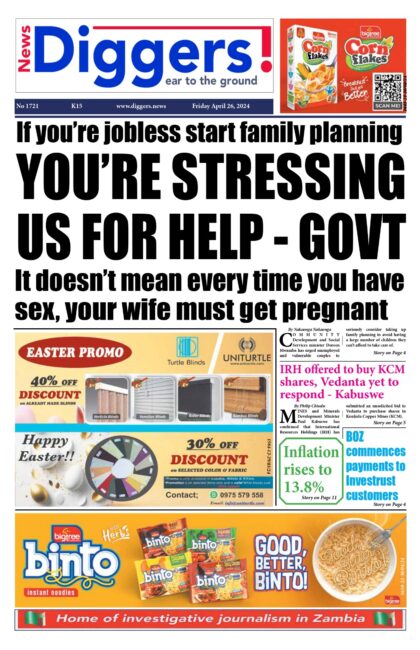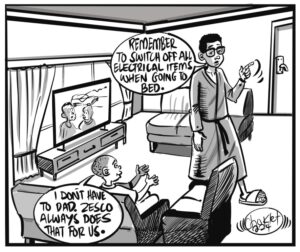Chief government spokesperson Dora Siliya says the fact that Zambians can sit and discuss various corruption scandals is an indication that government is working.
And Siliya says debt default does not necessarily mean that government misappropriated funds but that Zambia has had numerous challenges which had to be dealt with concurrently, at the expense of debt repayment.
Speaking during Diamond TV’s Diamond Live programme, Tuesday night, Siliya said the increasing revelations of corruption scandal by institutions like the Office of the Auditor General suggested that government had functional systems in place.
“If there was a report to show what government has done in response to the aspirations of the people, that Auditor General’s report would be very minimal. There are a lot of good things that government is doing but, in a country, where democracy is at play, those that are in public office are made to account. I’m happy that we live in a country like this where we can talk about the Auditor General’s report. The fact that we can be here and talk about this means that government is working. The fact that we live in a country where we can be discussing these issues, that is a fantastic thing,” Siliya said.
“The point I am trying to make is look let us also find the good things about our country to report on. We must not latch [on] one case. Issues of corruption is not an event. So government has not failed. What would be a failure is if people are not investigated, what would be a failure is if there is undue pressure whether it’s by those who have something to be investigated. What would be a failure is that there was no Anti-Corruption Commission, what would be failure is that there were no whistleblower laws. And the fact that you are talking about all these issues means that our systems work.”
And Siliya said debt default did not mean government misappropriated funds.
“I think that if there is any case of default, it does not necessarily mean that anybody is reckless. Even on a personal level, even in business, sometimes you borrow, sometimes the plan will go wrong, sometimes the factors around the variables may change and you are not able to do what you would according to your plan. So, to me, to say the default means you were necessarily reckless, I think that is not the fact. Now I believe that there are a lot of issues that have helped us arrive here. I think we have to look at what has led us to arrive here in the last 10 years. What has happened? One, the Zambian people wanted to see something happen in the country, we wanted to see more roads, schools, hospitals, housing, more power, more electricity. Zambians are now 17 million and we have to see a real shift. We have to borrow to make sure that we respond to the people’s needs. Now, in that borrowing, some external factors have taken place. For example, we are a non-oil country, we have to import oil, we have seen what is at place with the international oil prices,” she said.
“Number two, and we have to continue looking at the last seven, eight years. We are a country that is dependent on copper. And we have seen that copper moved in 2014, it came to the lowest about a thousand dollars from almost $10,000. Clearly if you are selling tomatoes at K10, they come to K1, you have lost that revenue, what would happen to the loan that you borrowed to be selling that tomato? And I think the Minister of Finance was delivering this point in Parliament. Whether it was the exchange rate, whether it was inflation, all these issues you have to really analyse them in an ecosystem. If the government was borrowing in 2013, 2014, what was at play at that time? Yes, you can try and anticipate some things but who anticipated the drought of 2015 which saw us start importing power at such a huge cost overnight? Who anticipated that the Zambian would really want to have power? I think it’s 600 Zambians every month registering to get connected.”
She said government had made early detection of leakages and irregularities possible.
“You want government to come in and say you know what Zambians, get used to not having power, get used to having bad roads, get used to not having enough hospitals? We can’t say that. We have to respond within the environment and say what can we do. We believe the Zambians understand. I think the question is not framed right. Because if a parent has five children and one is performing bad, I think it’s not ok to say that he is a bad parent. So to say because the country is having challenges to pay its loans is because there is recklessness, there are leakages, if you think that even when there are no laws in an economy, in a business you have to look at these leakages and address them as they should. And the government has done very well through the office of the Auditor Generals to ensure that these leakages are always noticed in good time, they are addressed,” said Siliya.
“That’s why we are talking about them. On the other side, we must be able to understand that look, government law is to solve people’s problems. And in this process government had to borrow and in that borrowing, then we saw like I said what happened. If we didn’t subsidise mealie-meal, the price would be K300 now, if we didn’t subsidise on fuel, the price would be K30, K40 now, is that what we want? If you want us to ask a Zambian, do you want us to remove subsidies and are you able to pay for a bag of mealie-meal for K300, K400 I’m not sure if that is attainable. If government removed subsidies, the people that would suffer would be the ordinary citizens.”












